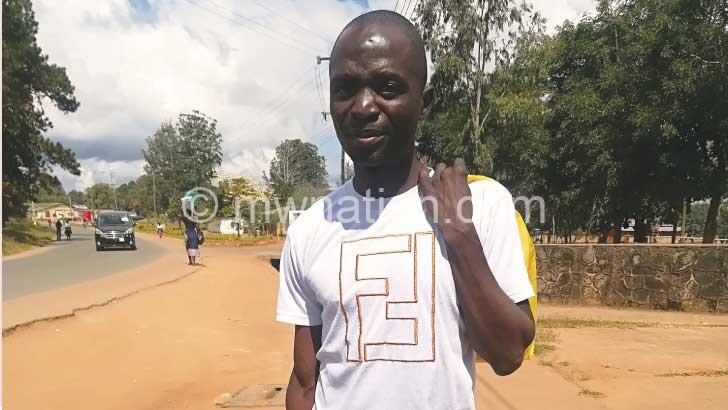Forgotten inmate walks free
Last week, on a sunny Tuesday, a frail-looking 41-year-old finally walked to freedom after “wasting 12 years” at Mzuzu Prison without trial.
Zimema Nyoni’s long wait for manslaughter trial personifies a common human rights violation that hides in the country’s congested correctional facilities.
“Justice delayed is justice denied,” he said, pacing home with two plastic carrier bags in his shrivelled hand—one resting on his left shoulder and the other dangling on his right chest.
In the bag religiously held close to his chest, he stashed two bibles and numerous bible school certificates accumulated in jail.
“During my long stay in confinement, I lost hope and turned to God as my refuge. I never imagined that I would walk free, leaving behind the high walls that became my home,” he said in an interview soon after his release.

Nyoni comes from Yohane Jere Village, Traditional Authority Mtwalo in Mzimba, where he accidentally killed his wife following a marital disagreement in July 2008.
He surrendered himself to the police, but never faced trial until June 3 this year when Justice Thomson Ligowe, sitting at the High Court in Mzuzu, sentenced him “to a period that results to his immediate release”.
Rights violation
Lawyers have described his lengthy detention without trial as a clear violation of human rights as well as the Criminal Procedure and Evidence Code.
Section 61 of the code limits pre-trial custody for murder suspects to 90 days, giving the courts the liberty to release the accused persons when the period expires without trial.
It reads: “In the subordinate courts, the trial must start within 30 days. In the High Court, the trial must start within 60 days, except for serious crimes when the limit is 90 days.”
Bail mystery
Ironically, Nyoni was “left to rot behind bars” after Justice Dingiswayo Madise granted him bail seven years ago.
He recalls: “I was granted bail in 2013 and some well-wishers gave me K30 000 to pay the bail bond of K20 000 ordered by judge Madise. I don’t know how this money was used. My mother pushed in vain for my release. I left everything in the hands of God,” says the father-of-two.
Watson Chirwa, principal advocate at the Legal Aid Bureau in Mzuzu, says Nyoni failed to pay the bail bond.
“I applied for his bail and it was granted on condition that he pays K20 000, but his relatives were not willing to pay that sum,” he states.
According to the lawyer, Nyoni’s case delayed because “his file went missing at police”, a common inefficiency in the country’s pen-and-paper justice system.
He explains: “It’s not normal for an accused person to stay on remand for 12 years. The State failed to bring the matter to court, saying his file went missing.
“The file used yesterday [on June 3 2020] was reconstructed. They had to re-interview him last month to come up with the new file.”
Chirwa is handling three other cases slowed by the disappearance of files.
“This is one of the reasons such cases take an eternity. Every time we go to court, we are told that files are missing,” he states.
Tracking case files
Peter Kalaya, the Northern Region police spokesperson, says the case files do not only vanish in police hands but also the hands of the State lawyers.
“The files go missing because of the lengthy procedure associated with murder cases. After investigating the cases, police officers hand over the files to the State advocate. We don’t take these cases to court,” he says.
The security agency has set aside officers to track murder cases and submit progress reports fortnightly, said Kalaya.
“Since we put in place new measures, we have noticed that files no longer go missing because this officer constantly reports why some murder cases are dragging,” he says.
Currently, over 1 000 murder suspects are still awaiting trial in the country’s congested prisons—and over 100 cases in Northern Region have dragged for more than five years.
Mzuzu Prison spokesperson McBeth Wasambo says 88 of 761 inmates at the facility are murder suspects.
“Some 13 murder suspects have been in jail for more than five years and Nyoni was the longest-serving inmate on remand,” he states. “The prison service doesn’t interfere with court issues because we only provide security to those incarcerated.”
Youth Watch Society executive director Muteyu Mukhuta Banda censures the country’s justice system for “going in circles” instead of ending “a culture of detention without trial”.
“We had several cases of detention without trial during the dictatorship regime. We thought that these excesses would be history with the restoration of democracy in 1993. Unfortunately, we are still grappling with this problem,” he laments.
Banda says progressive laws that protect suspects’ rights, including the Criminal Procedure and Evidence Code of 2010, are nothing without strict enforcement.
He explains: “It’s 10 years since we passed that piece of legislation. But are we really using the law? Malawi is failing to leapfrog a culture of dictatorship to make democracy work. The justice system is failing to uphold the rights of inmates and suspects,” he says.
As Nyoni marched home with his slow steps, he released his pent-up fears: “I don’t know how people, especially my two children, will welcome me. For now, I am going where I was living, but to my mother who will be happy to see me alive after so many wasted years.”





